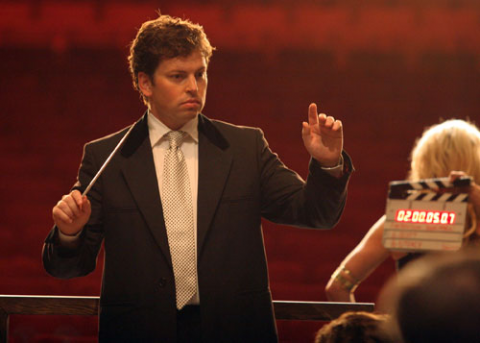Alumnus Realizes Olympic Dream

Dave Pierce '92 conducts the National Arts Centre Orchestra in Ottawa, Canada during production of the Olympic-inspired "Believe" music video.
Photo by Bell Canada
During the 1988 Calgary Winter Olympics, Dave Pierce '92 had a gig as a drummer at an after-party and got the chance to catch the games' closing ceremonies from the sidelines. What he experienced indelibly shaped his career goals.
"I was really overwhelmed by the music and the role the music plays in the Olympics," the Calgary native says. "As I stood on the sidelines, I made myself a promise. Every gig I got from thereon in had one criteria: Does this better hone me for the Olympics?"
On February 12 that dream will become a reality, as Pierce takes the reins as director of music for the opening, closing, and victory ceremonies of the Vancouver 2010 Winter Olympic Games.
After the Calgary games, Pierce enrolled at Berklee, where he majored in film scoring and commercial arranging (now contemporary writing and production). Here, he gained a skill that has served him throughout his career: learning how to finish a project. "I would get lost in an 8-bar score or outro and not finish it, put it in a drawer," recalls Pierce, "I had a real fear of finishing and letting go of creative control. I learned very quickly through my courseload at Berklee not to be afraid of finishing."
Due to legal and contractual considerations, Pierce couldn't divulge the details of the Olympic ceremonies but promised the music will be "different and memorable." From symphonic to contemporary to punk to indigenous Aboriginal music, the musical programs will surely cover a wide range. "The music reflects Vancouver and Canada, which have a wide scope of musicality, from East Coast fiddlers to the number of Hollywood movies that get recorded in Vancouver, and everything in between," he says.
Because of the necessary lead time for this sort of grand-scale production, Pierce says it was important to make sure the selections would be current. "To gauge where things are going to be is a challenge, especially musically. It can change in two years' time."
Rest assured, he's done his homework. "I've been to more concerts and listened to more music than I have in my life, keeping my finger on the pulse [of the music scene] and watching for emerging artists," Pierce says of his preparation.
For Pierce—whose credits include arranging and orchestrating Broadway productions, including the forthcoming Come Fly Away (a ballet based on the music of Frank Sinatra), as well as orchestrating the Radio City Rockettes shows—it's as though he's been preparing for this gig his whole career, waiting to produce something on such a large scale. "Before, when I've presented pieces for other jobs, they would be deemed 'too Olympic,'" says Pierce, joking that he's had to remove 1,000-piece choruses. "But this fits. Working on the Olympics has been like a breath of fresh air. . . . I like to work with a large number of musicians."
Indeed, more than 300 musicians have been tapped for the Vancouver games. While there will be live performances, the ceremonies will also feature prerecorded elements. When the first note is played, an estimated 3 billion people will be tuned in, from spectators in Vancouver to people tuning from around the world. "There's an emotional connection for athletes and people watching from the stands and on TV; everyone gets connected by the music. It's a very powerful tool. I love the size and scope of it," Pierce says.
